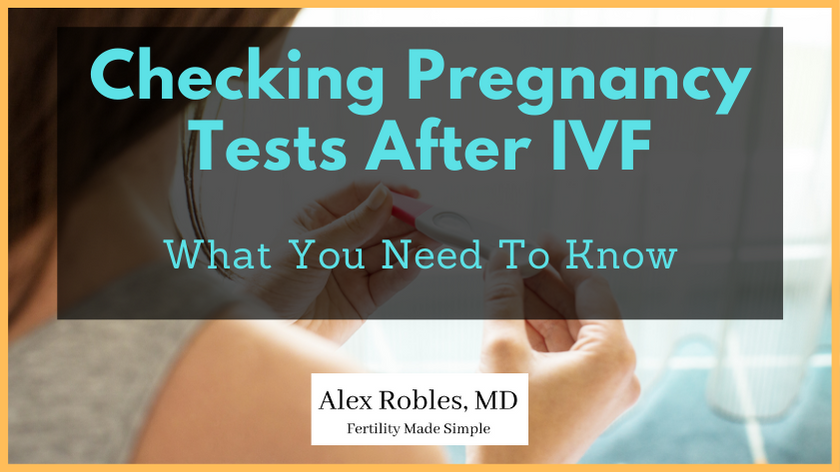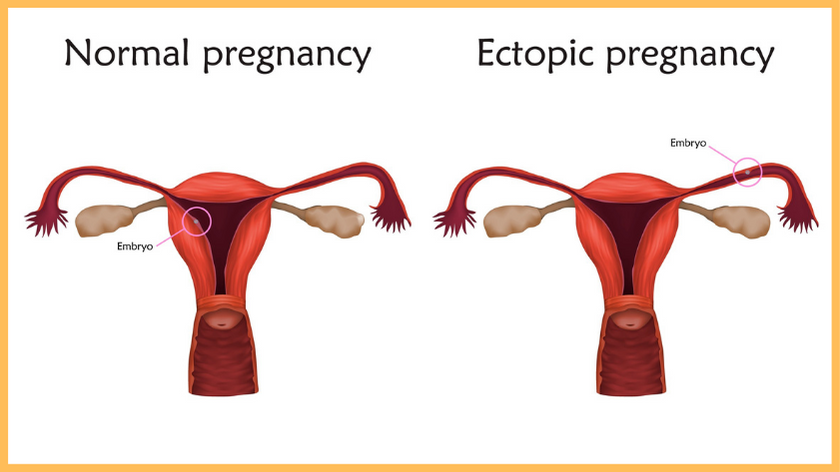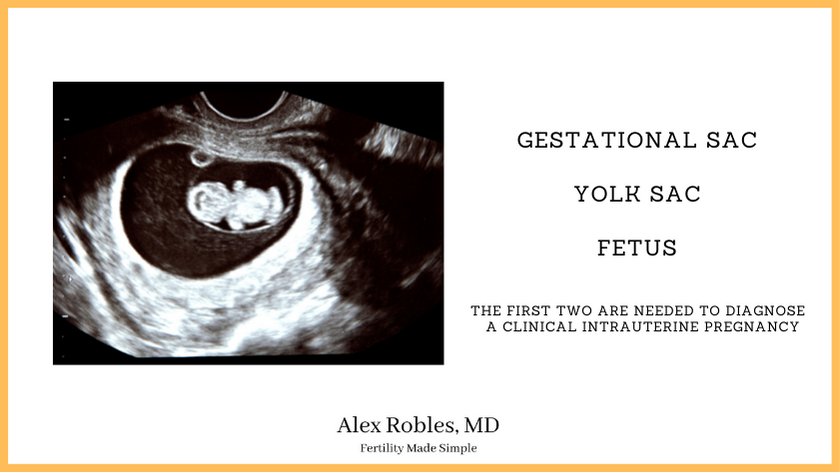The first step in determining the success of an embryo transfer after an IVF cycle is waiting for a positive pregnancy test.
Depending on the day of your transfer, it can take ~10-14 days for the pregnancy hormone b-hCG to be detectable in your body.
In this article, you’ll learn:
- How soon you should check a pregnancy test after an embryo transfer,
- What is b-hCG, and what levels indicate a positive result,
- Who should wait longer before taking an IVF pregnancy test
Let’s get started.

How soon can I take a pregnancy test after a 5 day IVF transfer?
The earliest you can check a pregnancy test after a blastocyst transfer is 9-10 days.
Beta human chorionic gonadotropin (b-hCG), the hormone that indicates that the fertilized egg has implanted into the uterine wall, rises at around 7 – 8 days after implantation.
With that said, I recommend that you don’t check a urine home pregnancy test. Instead, it would be best if you have your doctor perform a blood pregnancy test.
How soon can I take a pregnancy test after a 3 day IVF transfer?
With a day 3 embryo transfer, it is best to wait at least 12-14 days before getting a pregnancy blood test.
A day 3 embryo is still in the process of growing and dividing into a blastocyst. It takes longer to start the implantation process and achieve a high enough hCG level to get a positive pregnancy test.
What should I do during the two-week wait?
Stay positive, eat a well-balanced diet, and continue taking your progesterone supplementation.
You have done everything you can up to this point.
The rest is up to the embryo. Here are some things to avoid after an embryo transfer.
How do you know if the IVF cycle worked?
IVF is successful when you have a healthy, viable pregnancy after the embryo transfer.
However, the ultimate goal is a live birth, which is when you give birth to a healthy child.
The pregnancy test is the earliest indicator of whether or not your IVF (or, more specifically, embryo transfer) worked.
What hCG level confirms pregnancy?
You are considered pregnant with any detectable level of hCG.
hCG is not a hormone that your body usually produces. It is detectable only when there is evidence of embryo implantation.
In most labs, a value greater than 5mlU/ml is considered positive.
With that said, we generally like to see the initial value of ~50 mIU/ml) on the first IVF pregnancy test.
We are cautiously optimistic if there is a level under 50 on the first test.
Lower levels can indicate a failed pregnancy or an ectopic pregnancy.

Do regular home pregnancy tests work with IVF?
The detection limit of many at-home pregnancy tests is approximately 25mlU/ml. Therefore, they may not be able to detect your pregnancy depending on when you check the test.
In addition, this is a qualitative test, meaning that it only tells you if the value is positive or not.
A positive test doesn’t always mean that the pregnancy is healthy, and a negative test doesn’t always mean that you aren’t pregnant.
That is why we recommend that you get an office blood test, which is a quantitative test that provides a numeric value for the hormone hCG.
Who should wait longer before taking an IVF pregnancy test?
You should generally wait at least 9-10 days after a day 5 blast transfer and 12-14 after a day 3 transfer to check the test.
An early negative urine pregnancy test doesn’t mean that the transfer has failed.
The 2-week wait is essential!
How many weeks pregnant are you after IVF?
If you had a Day 5 transfer today, you would be approximately 2 weeks and 4 days pregnant (assuming the embryo implants).
If you had a Day 3 transfer today, you would be approximately 2 weeks and 2 days pregnant (assuming the embryo implants).
Your gestational age and due date are calculated from when your egg began to mature (the start of your menstrual cycle), not from the time of conception.
What should hCG levels be 12,14 or 16 days after the transfer?
12-16 days after a blastocyst transfer, you would be approximately 4-5 weeks gestation, which can correspond to a beta hCG level as low as 50 or as high as 1,000+ mIU/mL.
Twin gestations will have higher levels than a singleton gestation at the same gestational age.
Given that there is a wide range of levels that your b hCG level can be in early pregnancy, it is best to look at the trend rather than the absolute number.
In general, you should see your b hCG levels rising by ~50% every 48 hours.
With that said, levels in the lower end of this range might indicate a problem with embryo implantation.
What if the pregnancy test is negative after IVF?
If you have a negative pregnancy test at least 9-10 days after a blast transfer, the transfer was unsuccessful.
Unfortunately, a high-quality euploid embryo does not implant ~40% of the time. There is no way to predict who will and won’t be able to achieve a healthy pregnancy.
Your doctor will let you know if there are any other fertility treatments they recommend before trying again.
Other Related Questions
What is the difference between biochemical pregnancy and clinical pregnancy?
A chemical pregnancy refers to a pregnancy that has been identified only through a beta hCG test but failed to progress.
In other words, it miscarries before an ultrasound can detect it. Typically the hormone levels start low and ultimately downtrend back to negative.
A clinical pregnancy is when the embryo implants in the uterus and is identified by ultrasound at 5-6 weeks of gestation.
A gestational sac and a yolk sac should be visible on ultrasound to be categorized as a clinical pregnancy.

What is the hCG injection?
The hCG injection, or the trigger shot, is used to mature the eggs retrieved during your egg retrieval.
It mimics another hormone called Luteinizing hormone (LH), which ultimately causes the egg to mature and ovulate in a natural cycle.
Our goal is to retrieve the eggs after they become mature but before they ovulate.
Some fertility clinics check that the medication worked by checking your hCG hormones the next day after the trigger shot.
A positive home pregnancy test the next day also indicates that it worked.
Conclusion
- It is important to remember that a blood pregnancy test is the earliest indicator of success for an in vitro fertilization cycle.
- The earliest you should check is 9-10 days after a Day 5 transfer and 12-14 days after a Day 3 transfer.
- There is a large variation in what could be considered normal, but you should see your beta HCG levels rising by at least 50% every 48 hours.
- Avoid checking an over the counter pregnancy test, as testing too early can result in a false negative.
- If your IVF cycle wasn’t successful, don’t give up hope!
- There are many options available, so talk to your fertility specialist about how best to proceed after a failed embryo transfer.
Related Articles:
- Embryo Transfer Precautions: What You Should & Shouldn’t Do
- Miscarriage Symptoms After IVF (How To Know If It’s Happening)
- Ectopic Pregnancy After IVF: Symptoms, Concerns, & Safety
Make An Appointment With Dr. Robles To Discuss Your Fertility Options Today!

Alex Robles, MD
Dr. Alex Robles is a Spanish-speaking Latino-American Reproductive Endocrinologist and Infertility specialist in New York City, and a board-certified OBGYN. He has a special interest in health, lifestyle, & nutrition. Make an appointment with Dr. Robles to discuss your fertility options today!
References:
- Zbořilová B, Březinová J, Tkadlec E, Procházka M, Oborná I, Sobek A Jr, Sobek A. HCG level after embryo transfer as a prognostic indicator of pregnancy finished with delivery. Ceska Gynekol. 2018 Winter;83(5):329-336. English. PMID: 30848135.
- ACOG Practice Bulletin No. 191: Tubal Ectopic Pregnancy, Obstetrics & Gynecology: February 2018 – Volume 131 – Issue 2 – p e65-e77doi: 10.1097/AOG.0000000000002464
- Guth B, Hudelson J, Higbie J, Solomon B, Polley S, Thomas S, Gentry WL. Predictive value of hCG level 14 days after embryo transfer. J Assist Reprod Genet. 1995 Jan;12(1):13-4. doi: 10.1007/BF02214122. PMID: 7580002.
